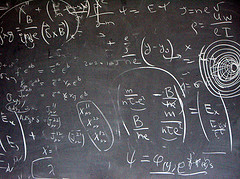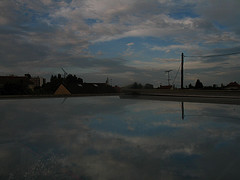September 25th, 2009 by Kevin Lindstrom | No Comments »
This week’s issue of Science focuses in CO2 capture and storage.
Articles include
Why Capture CO2 from the Atmosphere?
Round and Round: A Guide to the Carbon Cycle
Onshore Geologic Storage of CO2
Submitted by Kevin Lindstrom Liaison Librarian for Earth and Ocean Sciences
Posted in Atmospheric Science, Chemical and Biological Engineering, Chemistry, Civil Engineering, Earth and Ocean Sciences, General Science, Geography, Mining engineering, Science - undegraduate classes, Uncategorized | No Comments »
September 22nd, 2009 by Kevin Lindstrom | No Comments »
While working at UBC, I’m often amazed by some of the some spectacular sunsets I have ever seen. If you’re interested in learning more about the weather associated with these clouds have a look at the Cloud Appreciation Society website.
If you are interested in learning more about the weather in general, check out the Weather School.
For a more complete list of websites have a look at the Science and Engineering Library subject guide for Atmospheric Sciences
Today’s weather in Vancouver? Kiel?
Submitted by Kevin Lindstrom Liaison Librarian for Earth and Ocean Sciences
Posted in Atmospheric Science, Earth and Ocean Sciences, General Science, Geography, Physics, Uncategorized | No Comments »
September 16th, 2009 by Eugene Barsky | No Comments »

Scott Dunbar is an associate professor in the Norman B. Keevil Institute of Mining Engineering at the University of British Columbia. His recent work on biomining was highlighted in UBC Reports a few months ago – “The virus that binds: A novel idea marries biology and mining”
You can see much of the biomining research in the Web of Science database (for UBC folks, here is the direct link to the appropriate search )
** photo by Martin Dee
Posted in Chemical and Biological Engineering, Chemistry, Earth and Ocean Sciences, General Science, Main, Materials Engineering, Mining engineering, Science - undegraduate classes | No Comments »
August 25th, 2009 by Eugene Barsky | No Comments »

I have posted about climate engineering before. Here is the new article from the last issue of Science that discusses the risks of climate engineering – “Risks of Climate Engineering”
Risks of Climate Engineering
Gabriele C. Hegerl and Susan Solomon (21 August 2009)
Science 325 (5943), 955. [DOI: 10.1126/science.1178530]
This short opinion article presents the points against temperature changes potentially caused by geoengineering…
** photo by http://www.flickr.com/photos/courambel/
Posted in Atmospheric Science, Chemical and Biological Engineering, Earth and Ocean Sciences, General Science, Geography, Main, Physics | No Comments »
August 18th, 2009 by Eugene Barsky | No Comments »

All IMS articles 2004 and forward are freely available in a postprint format on arXiv <http://arxiv.org/>, as well as those articles posted by authors.
From the IMS website: http://www.imstat.org/publications/arxiv.html
ArXiv is an open access, fully automated electronic archive and distribution server for research articles, now owned and operated by Cornell University, and partially funded by NSF. The main fields it covers are physics, mathematics, non-linear science, computer science, and quantitative biology. Recently, arXiv has cooperated with IMS and the Bernoulli Society to open up a new statistics category within mathematics. We expect this category to eventually grow into a top level archive comparable to e.g. mathematics and physics.
Great news, IMS!
** photo by http://www.flickr.com/photos/saz/
Posted in Main, Mathematics, News, Science - undegraduate classes, Statistics | No Comments »
August 7th, 2009 by Kevin Lindstrom | No Comments »
“Vanish is a research system designed to give users control over the lifetime of personal data stored on the web or in the cloud. Specifically, all copies of Vanish encrypted data — even archived or cached copies — will become permanently unreadable at a specific time, without any action on the part of the user or any third party or centralized service.”
“For example, using the Firefox Vanish plugin, a user can create an email, a Google Doc document, a Facebook message, or a blog comment — specifying that the document or message should “vanish” in 8 hours. Before that 8-hour timeout expires, anyone who has access to the data can read it; however after that timer expires, nobody can read that web content — not the user, not Google, not Facebook, not a hacker who breaks into the cloud service, and not even someone who obtains a warrant for that data. That data — regardless of where stored or archived prior to the timeout — simply self-destructs and becomes permanently unreadable.”
For more information, visit the Vanish site at the Department of Computer Science, University of Washington.
There is a also a technical paper that will be presented at the 18th USENIX Security Symposium taking place this August in Montreal.
Submitted by Kevin Lindstrom Liaison Librarian for Electrical and Computer Engineering
Posted in General Science, Main, Uncategorized | No Comments »
August 5th, 2009 by Eugene Barsky | No Comments »

The International Mathematical Union is offering videos that were recorded at the International Congresses of Mathematicians in 1998, 2002, and 2006. IMU maintains the copyright of the videos but gives everyone interested the permission to download and show the videos.
http://www.mathunion.org/activities/icm/videos
** photo by http://www.flickr.com/photos/mscolly/
Posted in Main, Mathematics, Science - undegraduate classes | No Comments »
July 24th, 2009 by Kevin Lindstrom | No Comments »
The Niels Bohr Library and Archives of the American Institute of Physics holds more than a thousand tape-recorded interviews. Many of the oral history interview transcripts are now online. The interviews, conducted by the staff of the AIP Center for History of Physics and many other historians, offer unique insights into the lives, works, and personalities of modern scientists.
For more information, go to Niels Bohr Library & Archives
Submitted by Kevin Lindstrom Liaison Librarian for Physics and Astronomy at the University of British Columbia.
Posted in Astronomy, General Science, Physics, Podcasts | No Comments »
July 20th, 2009 by Eugene Barsky | No Comments »

New Scientist reports about the final draft of the American Meteorological Society‘s carefully worded position paper on geoengineering. The AMS is the first major scientific body to officially endorse research into geoengineering.
From New Scientist:
The document states that “deliberately manipulating physical, chemical, or biological aspects of the Earth system” should be explored alongside the more conventional approaches to climate change. Conventional approaches means reducing emissions – “mitigation” in policy-speak – and adjusting to the unavoidable effect of climate change – known as “adaptation”.
The paper states that “even aggressive mitigation of future emissions cannot avoid dangerous climate changes resulting from past emissions. Furthermore, it is unlikely that all of the expected climate-change impacts can be managed through adaptation. Thus, it is prudent to consider geoengineering’s potential benefits, to understand its limitations, and to avoid ill-considered deployment”.
http://www.newscientist.com/article/dn17490-climate-engineering-research-gets-green-light.html?DCMP=OTC-rss&nsref=online-news
** photo by courambel
Posted in Atmospheric Science, Chemical and Biological Engineering, Chemistry, Earth and Ocean Sciences, General Science, Geography, Main, Materials Engineering, Physics, Uncategorized | No Comments »






